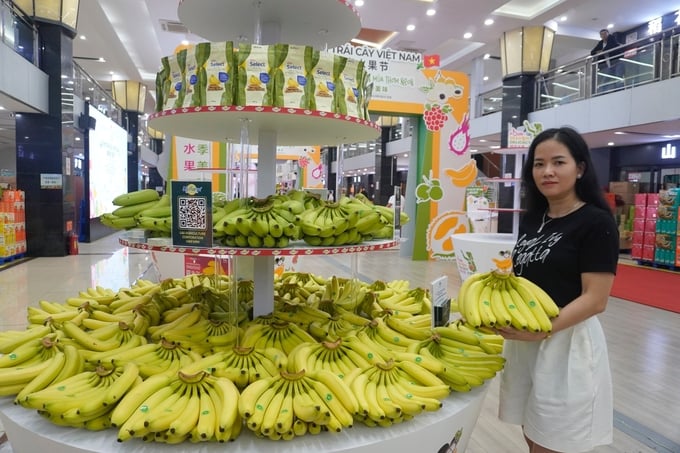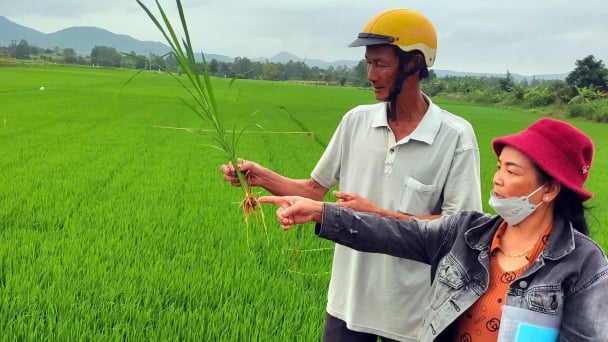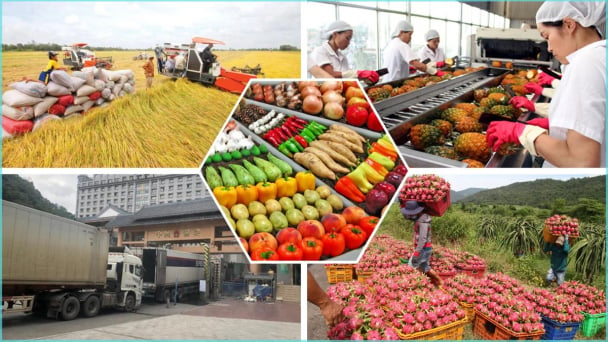June 5, 2025 | 17:40 GMT +7
June 5, 2025 | 17:40 GMT +7
Hotline: 0913.378.918
June 5, 2025 | 17:40 GMT +7
Hotline: 0913.378.918

Banana booth of U&I Agriculture Joint Stock Company (Unifarm) at the first Vietnam Fruit Festival held in Beijing, China in 2024. Photo: Hong Tham.
Vietnam exported nearly 625.25 thousand tons of bananas to the Chinese market in 2024, which accounted for the largest proportion of China's total banana imports, according to statistics from the General Administration of Customs of China. Vietnam's banana export volume increased by 23.7% in comparison to 2023, enabling the nation to surpass the Philippines as China's primary banana supplier.
In addition to the rise in export volume, Vietnam's total banana export value increased by 7% year over year, reaching USD261.45 million. The average export price of Vietnamese bananas, however, was USD418.1 per ton, reflecting a 13.5% decrease from 2023. This price remains substantially lower than that of competitors like Cambodia (USD642.3 per ton) and Ecuador (USD667.6 per ton). Vietnam's market share in China is anticipated to be expanding due to its competitive pricing.
The Philippines, which was previously the largest banana supplier to China, stepping back to second place in 2024, exporting a mere 463.3 thousand tons, a 32.4% decrease from the previous year. Additionally, the export value experienced a 38.8% decline, ultimately amounting to USD261.6 million or less. The average export price of Philippine bananas was USD564.7 per ton, reflecting a 9.3% decrease, but still substantially higher than the bananas from Vietnam.
The challenges encountered by Filipino banana producers, such as high production costs, pests, logistical issues, and unpredictable weather conditions, have been further exacerbated by the decline in exports. The Philippine Star reports that the nation is also facing an uptick in competition from suppliers in neighboring countries, including Vietnam, Cambodia, and Laos.
Cheryl Marie Natividad-Caballero, the Philippine Undersecretary of Agriculture, saw that these countries have enhanced their production capacity and are able to offer reduced prices, which makes their bananas more appealing in critical markets such as China and Japan.
Ecuador was the third-largest banana supplier to China in 2024, exporting more than 248.4 thousand tons, a 6.6% decrease from 2023. The total export value decreased by 9.6%, reaching USD165.8 million. In spite of the decline, Ecuador's average banana export price remained at a high level of USD667.6 per ton.
Ecuador's banana exports to China experienced a 33% increase between 2022 and 2023. Nevertheless, the extensive transit distance from South America to China presents a significant obstacle for Ecuadorian bananas, resulting in an average import cost of USD690 per ton. This implies that Ecuadorian bananas are 41 times more costly than Vietnamese bananas in the Chinese market. Banana traders from Ecuador and China, as well as their respective governments, have been striving to reduce the cost of exporting bananas to China for the past five years.
Cambodia maintained its fourth position among China's largest banana suppliers in 2024, despite a 5.8% decrease in volume and a 16.3% decrease in export value, with over 247.57 thousand tons of banana exports. The average banana export price in Cambodia was USD642.3 per ton, which was substantially higher than that of Vietnam.
In 2024, Laos achieved extraordinary growth by exporting more than 79.73 thousand tons of bananas to China, a 136.7% increase from 2023. The total export value increased by 70.3%, reaching nearly USD39.8 million. Despite the fact that the average export price of Laotian bananas remained relatively low at USD498.6 per ton, the country's rapid development could pose a significant challenge to Vietnam's banana export trade in the future.
According to Zhang Zhongyi, the General Manager of Beijing Yongxin Hengchang Fruit Co., a retailer that specializes in Laotian bananas in China, Laos enjoys optimal land and climate conditions for banana cultivation, leading to the production of fragrant and soft bananas that are exceedingly popular among Chinese consumers.
The emergence of Vietnam as China's primary banana supplier in 2024 is a positive indicator of the country's robust banana production and export sector. Vietnam has effectively surpassed the Philippines to become the largest banana supplier to China, leveraging its competitive pricing, low transportation costs, and geographical advantages.
Nevertheless, in order to maintain and increase its market share, Vietnam's banana industry must continue to improve product quality, diversify product varieties, and rigorously regulate production processes to ensure that they meet export standards. Furthermore, brand-building initiatives and the enhancement of the value of Vietnamese bananas could contribute to the increase in average prices, the enhancement of profitability, and the preservation of a robust presence in the Chinese market.
Translated by Linh Linh

(VAN) On June 4 (local time), Deputy Minister of Agriculture and Environment Nguyen Hoang Hiep and the delegation attended the Global Platform for Disaster Risk Reduction (GP2025).

(VAN) UNESCO has officially awarded the Certificate of Recognition designating Lang Son Geopark as a UNESCO Global Geopark.

(VAN) The Food and Agriculture Organization of the United Nations (FAO) has appointed Alue Dohong as Assistant Director-General and FAO Regional Representative for Asia and the Pacific.

(VAN) Reuters, AP News, Washington City Paper and other outlets reported on the recent large-scale agricultural trade cooperation event between Vietnam and the U.S.

(VAN) At Thaifex Anuga Asia 2025, Asia’s leading food and beverage trade show, more than 170 Vietnamese enterprises are participating, with Vinamilk having been a consistent presence for nearly 20 years.

(VAN) On June 3, the Institute of Agricultural Environment organized a workshop titled 'Supporting greenhouse gas inventories in agriculture: Enhancing technical and governance insights for rice production in Vietnam'.

(VAN) In the first 5 months, the export turnover of agricultural, forestry, and fishery products rise significantly, thanks to a relatively stable domestic production and export market.